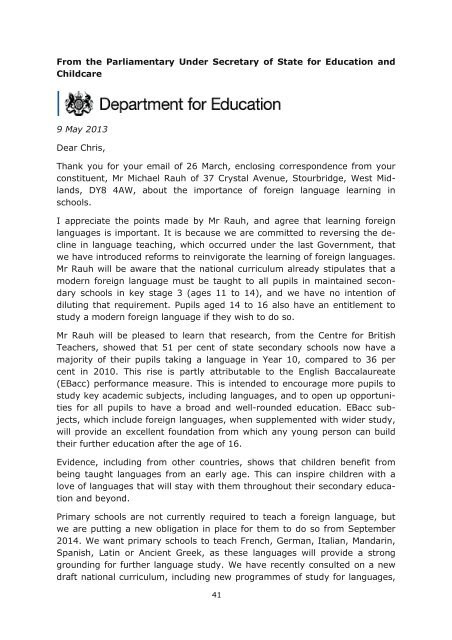Summer 2013 - The Independent Schools' Modern Language ...
Summer 2013 - The Independent Schools' Modern Language ...
Summer 2013 - The Independent Schools' Modern Language ...
Create successful ePaper yourself
Turn your PDF publications into a flip-book with our unique Google optimized e-Paper software.
From the Parliamentary Under Secretary of State for Education and<br />
Childcare<br />
9 May <strong>2013</strong><br />
Dear Chris,<br />
Thank you for your email of 26 March, enclosing correspondence from your<br />
constituent, Mr Michael Rauh of 37 Crystal Avenue, Stourbridge, West Midlands,<br />
DY8 4AW, about the importance of foreign language learning in<br />
schools.<br />
I appreciate the points made by Mr Rauh, and agree that learning foreign<br />
languages is important. It is because we are committed to reversing the decline<br />
in language teaching, which occurred under the last Government, that<br />
we have introduced reforms to reinvigorate the learning of foreign languages.<br />
Mr Rauh will be aware that the national curriculum already stipulates that a<br />
modern foreign language must be taught to all pupils in maintained secondary<br />
schools in key stage 3 (ages 11 to 14), and we have no intention of<br />
diluting that requirement. Pupils aged 14 to 16 also have an entitlement to<br />
study a modern foreign language if they wish to do so.<br />
Mr Rauh will be pleased to learn that research, from the Centre for British<br />
Teachers, showed that 51 per cent of state secondary schools now have a<br />
majority of their pupils taking a language in Year 10, compared to 36 per<br />
cent in 2010. This rise is partly attributable to the English Baccalaureate<br />
(EBacc) performance measure. This is intended to encourage more pupils to<br />
study key academic subjects, including languages, and to open up opportunities<br />
for all pupils to have a broad and well-rounded education. EBacc subjects,<br />
which include foreign languages, when supplemented with wider study,<br />
will provide an excellent foundation from which any young person can build<br />
their further education after the age of 16.<br />
Evidence, including from other countries, shows that children benefit from<br />
being taught languages from an early age. This can inspire children with a<br />
love of languages that will stay with them throughout their secondary education<br />
and beyond.<br />
Primary schools are not currently required to teach a foreign language, but<br />
we are putting a new obligation in place for them to do so from September<br />
2014. We want primary schools to teach French, German, Italian, Mandarin,<br />
Spanish, Latin or Ancient Greek, as these languages will provide a strong<br />
grounding for further language study. We have recently consulted on a new<br />
draft national curriculum, including new programmes of study for languages,<br />
41



